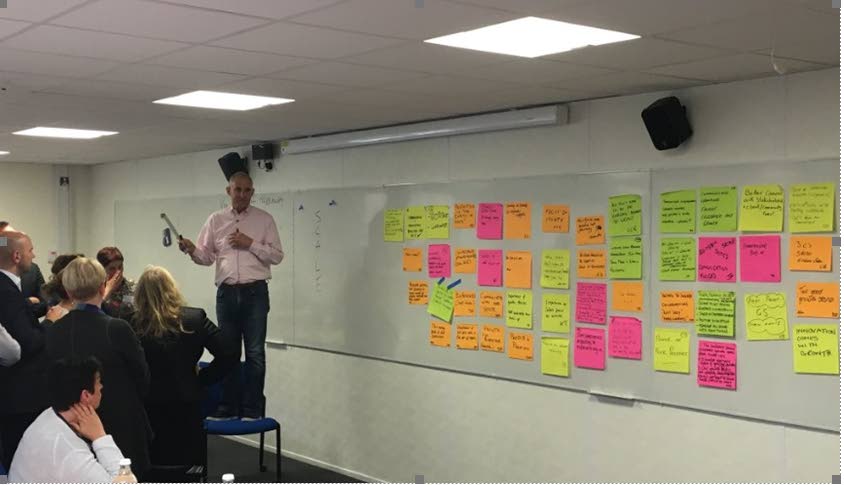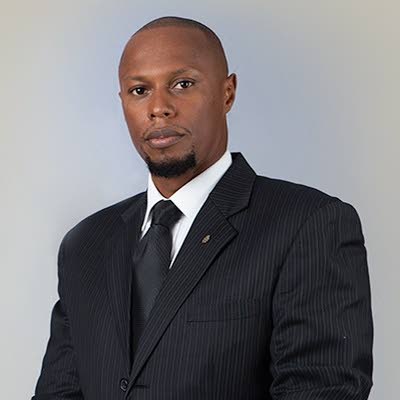Small business won’t drive growth unless they scale up

Daniel Isenberg and Waltnel Sosa are brisk and impatient.
The former is the founder of the Scale Up ecosystem, the world’s first accelerator for medium-sized businesses, a professor at Columbia Business School and an associate of the Harvard Kennedy School of Government, amongst other things.
The latter is a sought-after consultant who returned to TT after a stint in international finance, and serves on a number of boards, including that of Republic Bank.
Prof Isenberg’s project, Scale Up, has now spread to more than 15 cities, following an early success in the Colombian city of Manizales, where its graduate companies grew by 35 per cent each, creating “1,291 new jobs, 1,451 new contracts and 12 new exporters.”
Seeing a major productivity gap in TT, with anaemic historical growth, Sosa reached out to Isenberg, alongside Nigel Edwards, the executive director of the Unit Trust Corporation, about launching locally. The result: the first successful cohort of companies graduated on June 29.
The success stories have spoken for themselves. In just a few examples, Amaranth Business Solutions grew monthly sales by 19 per cent; JD Cairn increased training-school revenue by 75 per cent; and TRICON increased market share in Puerto Rico to 20 per cent, representing 40 per cent monthly growth.
These are impressive numbers that should no doubt have companies beating down the door.
But how did they do it? I sat down with Isenberg and Sosa to find out why.

What are some of the success stories from your programme?
Isenberg: You will hear from the companies themselves. They’re exporting for the first time or earning foreign currency for the first time, finding access to larger markets.
We (TT) have more competitive strength than you realise. We’re exporting to Jamaica, Puerto Rico, Guyana.
There are many examples of companies acquiring new customers, and collaborating with each other spontaneously. There’s a pretty wide variety – ranging from services to technology to small manufacturing, retail, B2B. A much larger minority of companies than people can think that can grow.
Startups can take years to grow. With the profile of companies that we work with, we see the path to increasing their growth is weeks and months.
Despite that diversity, they each have a lot to learn from each other. We have companies from light manufacturing in Tobago, three in agro-processing. We have a few technology companies as well. Even in difficult times, companies can still grow.
What are some of the problems that they were able to identify with the programme’s help?
It’s the 80/20 rule. If you can acquire and develop new customers, you’ll grow. If you can develop more cash from your operation, you can have access to more resources.
For example, going into new market segments, you have to understand where you deliver unique or unusual value. We drill people on how they deliver unique value.
It’s a little bit like hiring a personal trainer – you know what you need to do, but doing it is a different story.
It’s not based on new ideas; it’s based on executing simple ones. The basics are cash, customers, and capacity. For example, raising prices –one of the scariest things that entrepreneurs do. We help show them how they raise prices.
Also going into a situation where you can get paid on time. Profit doesn’t matter if you don’t have good cashflow.

Sosa: A lot of the feedback around what I’ve discussed is creating a culture of cash in our company – even with customers. A lot of people feel uncomfortable reminding customers to settle bills on time.
Where everybody is looking at the role that they play, the culture can change. I saw a lot of lightbulbs go off in that room.
How does the programme practically help companies?
Isenberg: We have a number of unique elements. For every one of these concepts, we have developed a proprietary self-assessment. How well do we do at sales? They compare themselves with other companies. We put Walt’s company and my company together to share experience.
This sounds like very mundane stuff. but it works. It can be advice from peers like: “We actually go around in a car and pick up the cheques from people.”
I bring that back to my team in the next 20 minutes, and someone else brings back a new idea to their company. We now see which of these can we implement.
It’s very practical. These people are busy – they are hunkered down. They don’t have time to screw around with theories. We try to give them tools for quick wins.
Think if instead of three companies we do this with 11 companies, and all of them are learning, and growing and building a community of growth that will last beyond the scalerator. It’s a group of companies that work together. It’s not mystical; it’s not: “we grow and become unicorns” (a term referring to startups that are worth a billion dollars).
Walt will engage them in a new kind of question that the companies haven’t asked before. What if it were this, what if it were that?
Some of those companies’ customers say no, some of them will say yes. Those that say yes, my colleague calls these gravity dollars. A lot of people talk about angel investors and unicorns. We’re workhorses.
How do you scale the scalerator?
Isenbergl: The purpose of this particular cohort is to tell the stories. Imagine, instead of 20 growth stories, there were 200 growth stories. We didn’t do anything magical. When we get a critical mass, the culture changes, the heroes change. The truth is not everyone wants to change.
These companies trusted each other. Part of what they commit to is being open. Once you break the ice, they’re people, they want to talk. Will I get more benefit from keeping it close to my chest?
We purposefully don’t invite companies in the same industry to build that trust. Some of the feedback we’ve received: “When I realised the richness and value of sharing, I myself begin to share.” I was very encouraged by the feedback from the partners.
Were there any particular problems in TT?
Isenberg: There was no difference between the way the group came together in TT. Once they broke the ice, there is a feeling.
How did you come up with the idea for the scalerator?
Isenberg: I helped Israel set up their first incubator in 1984 and worked with an extraordinarily successful company. Tungsten Carbide – they make metal cutting tools. They are one of the largest in the world. This was Warren Buffet’s first acquisition outside of the United States. I had a mentor – part of his vision was to create an incubator – including everyone who made something.
Why does most international government policy focus mainly on small businesses and start-ups and not on existing businesses?
Isenberg: Startups are compelling because they’re very easy to seed. Between that and getting a customer. The only thing startups talk about is raising investment. The entrepreneurs are not yet out there selling to customers. TechCrunch never says Waltco just broke $10 billion in revenue. They say it has zero customers. Dan Isenberg gets called an angel because he invests in a startup.
There are lots of them, so from a politician’s point of view, why support one company when you can support more companies?
Personally, I’m a limited partner in two VC (venture capital) funds in MIT, and so I have a portfolio of 23 companies that I’m invested in. I actually put my own money in them – some of them are doing pretty well.
There’s a difference between being well intentioned and well equipped. We saw here a lot of people saying we should be helping the micro enterprises: what about the little man, what about the students? How do you do that, how to you accomplish that?
You have to show them a path to growth.
Most developing countries, including TT, have a strong family business dynamic. How do you see that working?
Isenberg: The US is an exception. Everyone else in the world works mostly in family businesses. But look, the ownership is not the critical element, the critical element is product market fit. You talk about trust. One of the reasons family businesses work is that they take away some of what economists call friction or noise, but there are also problems because then my first cousin gets involved. Some companies are just conduits for returning money to the shareholders and that distorts the financial structure of the company which makes it much harder to get financial structure for banks to lend to you. It makes it harder for you to grow.
Does this solve countries’ structural challenges?
Isenberg: Again, it is the 80/20 rule. Israel was not at all a hospitable place for business in the 1980s. Yes we had tremendous challenges with FX, and yes there are other challenges.
If at the end of the day, if companies all dealt with the 80 per cent of problems, then you can focus on the 20 per cent (of structural problems). The government is not against it and there is already venture capital. One of the beautiful things about entrepreneurs is by definition, they succeed in less-than-ideal conditions.
If you think how bad it was in the 1970s, look at Israel. In 1970s, our first exports were to New York. You think you have it tough? That was tough.
How can companies use technology to grow?
How can they not use technology as part of their growth? You cannot be competitive without using HR software, using social media to attract and also communicate your culture, and also to communicate to your employees. If you’re not using programmes – Salesforce is just one of them – how do you build pipeline? You’re not going to survive if you don’t.
If you collectively decide to do something, you can do it.
Kiran Mathur Mohammed is an economist and co-founder of medl, an IDB lab-backed social impact health tech company

Comments
"Small business won’t drive growth unless they scale up"